August '24 Monthly Review
This is the eighth post of my series of monthly review posts for 2024. Other entries in the series:
Home
The kids have been on summer holiday this month, which always dampens my mood as it means I end up stuck in the office upstairs working, while they're downstairs playing. We are grateful that we now have the garden space where they're able to safely rampage around, and it's been nice observing them playing together. Our wildflowers have most likely reached their pinnacle for the year, with an eclectic mix of poppies, borages, cornflowers, nasturtiums and even some sweet peas!
Halloween building and preparation continues - I have a structure in place for the main centrepiece now, and as it's all inside the garage it means I can keep it away from the elements and close the garage door on a night. Last year I lost a lot of my handpainted floating candles to some rain after I was too slow to take them down. So once the main piece of the display is done, I'll have lots of itty-bitty adornments to craft and paint. Hoping that this year is a good'n and that we get lots of trick-or-treaters!
Work
At work we've dubbed our current AWS Platform as version 2.5. Version 2.0 comprises four shared AWS accounts, with some VPC and subnet segregation within each, which acts as a route to live. We have a few workloads remaining in these accounts that we're working to migrate over the next half year or so. The 2.5 space gives each 'functional area' its own route to live, through four dedicated accounts with a standard configuration - I covered the networking aspect of that last time. This is a much better operating environment as it reduces the blast radius from noisy neighbours. However, it isn't quite where we want it to be - functional areas can still be large and contain multiple workloads. So I'm beginning to think about what a '3.0' would look like for us, although it's probably more of a v2.75 than a v3! The built-in functionality and additional capabilities of AWS Organizations has grown considerably since it was last looked at by our platform engineering team, with many of the bespoke services we've created being provided out-the-box nowadays. I can therefore look into concepts such as AWS Control Tower. This is stretching me in my role as a Principal, in a good way. It's nice to get out of the day-to-day and think strategically and prepare the ground for what's coming in the future. I'm reaching out to team members to gather both positive and negative thoughts on our target position - understanding the reasons for dissent is arguably more important than those with affirmative opinions. It signals that it is safe to disagree, it is healthy to diverge and converge on a way forward. To some extent, this will be my 'legacy' in the role and so I'm acutely aware that I wish to model those behaviours I appreciated from those who've served at this level before me.
AEW All In
For the second year, All Elite Wrestling returned to Wembley Stadium for their 'All In' event, which is now being pitched as their flagship show. With a different stage setup to last year they weren't aiming to top the previous 70,000+ attendance figure, but from where I was sat the stadium still looked pretty full. Venue organisation was much better this time, in particular around queueing to get in. I had a fun time watching some of the finest wrestling I've seen live. My highlights included MJF vs Ospreay and the main event, Swerve Strickland vs Bryan Danielson. The latter of these was a "Title vs Career" match, which meant it was either going to be Danielson's retirement or a crowning of a new champion. Not that Swerve made it a cakewalk, there were lots of false finishes to the match which only intensified, leading to Wembley's own Yes moment. What a night!
Books
Ninth House by Leigh Bardugo
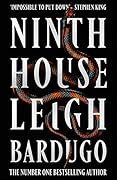
An interesting supernatural horror set on Yale's campus, in which there are eight secret societies (you probably know some of them) that partake in magic, each their own discipline. There is the aforementioned 'Ninth House' which serves to oversee the magic activities of the others, to which Alex Stern, the protagonist, is enlisted. The novel follows her first year, in which she investigates a death, confronts various dangerous supernatural entities, and searches for her missing mentor. I thought this was an engaging novel, which keeps you guessing on who the culprit is. The protagonist is a complex, flawed character with some aspects of an unreliable narrator, adding more to the general mystery that the triology is building to. Magic schools are somewhat done to death, what with Harry Potter and the Scholomance series, but I thought this book started a new series strong, with a darker tone that I appreciated.
Introducing Descartes, the Graphic Guide by Dave Robinson and Chris Garratt
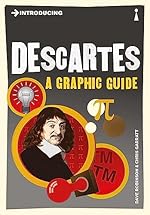
The 'Introducing' graphic guide books are a pretty solid starting point for anyone who wants to dip their toes into a topic - they go into a decent amount of depth and remain accessible. I have started reading a book on Complexity Theory as part of a reading group. The first chapter dipped into the philosophical underpinnings, mainly to ground the later chapters. But, outside of philosophy as it relates to science and economics, I'm a little less clued in than I really ought to be. Where else to start but Descartes, the man behind "I think therefore I am". I felt that this book gave a good overview of Cartesian philosophy, in addition to his contributions in mathematics, with a good deal of critique to the core ideas. Back when I used to run the Newcastle Skeptics in the Pub group, we'd very often host participants at the Open Mic Night who'd argue that we're not real sceptics (c, not k), and that actually, Descartes said can we really know anything. I felt at the time these were rather superficial understandings of the philosophy aimed to provoke rather than to inquire, now, a decade later, I feel closer to having the tools to explaining why I had that inclination. I'm going to follow on this series with Kant and Hegel, and Sartre, and then pretend to be all highbrow and that.
Introducing Chaos, the Graphic Guide by Iwona Abrams and Ziauddin Sardar
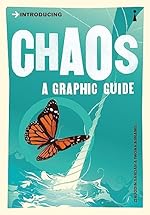
Another in the Introducing series, going a little deeper into Chaos Theory. This came about from going down a rabbit hole in the Descartes book (which itself is a rabbit hole from a book about complex systems), focusing more on the underlying structures of uncertainty - think of the Three Body Problem in orbital mechanics - the unpredictability of three masses orbiting each other in space. After covering Mandelbrot and the mathematics of fractals, the book then concludes with order out of chaos and how this affects reality. In other words, it is the irreversibility of chaotic systems which leads to order. Further, in complex systems, which are adaptive and phase between order and chaos, emergent properties such as self-organization occur. This is fascinating stuff and the book only really scratches the surface of a deep seam of understanding.
Right Kind of Wrong: Why Learning to Fail Can Teach Us to Thrive by Amy Edmondson
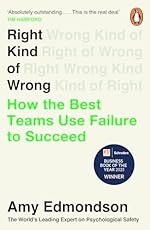
Prof. Edmondson is well-known in the Agile community for popularizing the concept of 'Psychological Safety', through her book 'The Fearless Organization' (which I must re-read). This notion relates to creating an environment where speaking up, and speaking out, is welcomed and encouraged, rather than discouraged. Psychological Safety creates healthier working environments and better-performing ones. Edmondson goes deeper into why that is in this text - in how failures are handled.
Failure is a somewhat loaded term, as it can imply many things: blame, poor performance, carelessness, even purposeful sabotage! Some and all of those things can be true, but there's more - what if there is a productive way to fail, that moves everyone forward? Anyone familiar with the Scientific Method ought to know this already, alas, when it comes to business this culture needs to be put in place.
Edmondson describes Intelligent Failures as ones that
provide valuable new knowledge. They bring discovery. They occur when experimentation is necessary simply because answers are not knowable in advance.
These are the types of failures that you want to encourage and celebrate - they generate learning and inform what to do next. Indeed they can even become exaptive, with the classic example being how the culture at 3M allowed for a 'failure' to be turned into an entirely new product: the Post-it Note.
To fail in the right way you also need to reduce the opportunities for failure in the wrong ways. These can be baisc failures - mistakes in a well-understood domain - or complex failures, which are also in familiar spaces but seemingly uncontrollable due to some external factor. However, with a systems thinking approach it can be possible to understand that these type of errors are ones that build up, the compounding effect becoming catastrophic if not course-corrected. Psychological Safety plays an important role in allow people to speak up and point out mistakes, in a blameless manner.
Games
Thank Goodness You're Here!
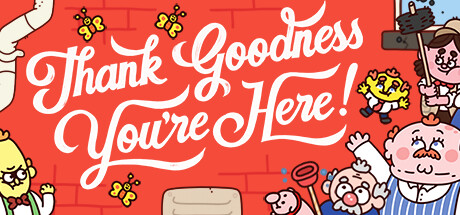
This is more of an interactive visual novel than a game, but if I needed to describe it in five words, it's "Vic and Bob, the Game". Quirky, eccentric, Dada-esque British humour. You follow the journey of a little man who works his way through a village inspired by Barnsley, Yorkshire. Everything about this game is hillarious, from the story itself, to the side quests, the anti-Thatcher background graffiti. I don't want to spoil anything about the experience! It doesn't take long to complete, but in the short time it occupies your brain, it demands your full attention and entertains you thoroughly.
Portal and Portal 2

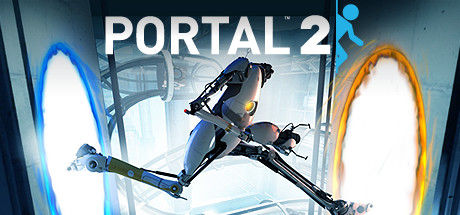
I had a sudden burst of nostalgia and cracked open Portal on the Steam Deck. Firstly, Valve released Portal just I was starting university and I'm not mentally prepared to accept that was 17 years ago. Portal plays beautifully on the Steam Deck, as you'd expect for a Valve game on Valve hardware. It's a short but technically impressive game, that crams a huge amount into about an hour's gameplay. Come to think of it, Portal pulls on the strings of the uncanniness of liminal spaces, predating the Backrooms by a decade. Naturally, it wasn't enough thinking with Portals and so I moved straight on to Portal 2. It also plays extremely well on the Steam Deck, albeit with slightly longer loading times because of the larger environments. I thoroughly enjoyed re-learning all the new mechanics, such as the light bridge and fluids. These games haven't aged, unlike me.